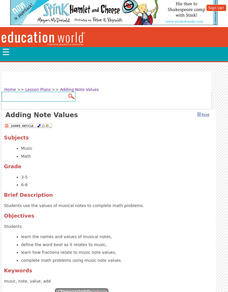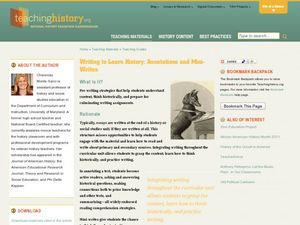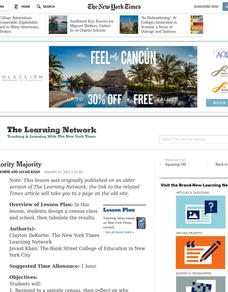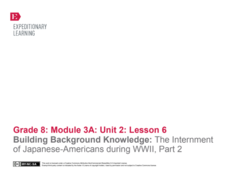EngageNY
Margin of Error When Estimating a Population Proportion (part 1)
Use the power of mathematics to find the number of red chips in a bag — it's a little like magic! The activity asks learners to collect data to determine the percentage of red chips in a bag. They calculate the margin of error and...
Curated OER
Briefly Noted: Practicing Useful Annotation Strategies
Post-It notes, highlighting, underlining. Sam Anderson’s New York Times Magazine article, “What I Really Want Is Someone Rolling Around in the Text,” launches a study of “marginalia,” or writing thoughts in the margins of a text. After...
EngageNY
Margin of Error When Estimating a Population Mean (part 1)
We know that sample data varies — it's time to quantify that variability! After calculating a sample mean, pupils calculate the margin of error. They repeat the process with a greater number of sample means and compare the results.
EngageNY
Margin of Error When Estimating a Population Mean (part 2)
Don't leave your classes vulnerable in their calculations! Help them understand the importance of calculating a margin of error to represent the variability in their sample mean.
EngageNY
Margin of Error When Estimating a Population Proportion (part 2)
Error does not mean something went wrong! Learners complete a problem from beginning to end using concepts developed throughout the last five lessons. They begin with a set of data, determine a population proportion, analyze their result...
Curated OER
Note-Taking Skills
Students take a closer look at their note-taking skills. In this communication lesson, students summarize information by taking notes using the various methods that their instructor presents to them.
Benjamin Franklin Tercentenary
From Ben’s Pen to Our Lives
What would Ben do? Jumping off from the pseudonymous letters Ben Franklin fooled his older brother into publishing when he was still a teenager, young literary lovers dive into acting, writing, and addressing a local issue with wit and...
Curated OER
Adding Note Values
Students use the values of musical notes to complete math problems. They study the names and values of musical notes, define the word beat as it relates to music. They complete math problems using music note values.
Carolina K-12
The Great Depression
From Black Tuesday to Hoovervilles and the Dust Bowl, here is a resource that offers a comprehensive overview of the Great Depression. It includes a detailed PowerPoint presentation and guided notes template, activities for analyzing...
EngageNY
Building Background Knowledge: Vietnam as a “Battleground in a Larger Struggle”
Read. Stop. Think. Scholars use a reading strategy to process the challenging text, "The Vietnam Wars." They read a paragraph and then stop to think about the text and its meaning. Readers then go on to work with partners and make notes...
EngageNY
Analyzing Text Structure: “Teen Slang: What’s, Like, So Wrong with Like?”
What did you say? Class members read Teen Slang: What’s, Like, So Wrong with Like and make notes in the margin to determine the gist. They then analyze the text to identify claims made and the evidence to support the claims....
Curated OER
Putting it all Together
Students take notes and summarize information. In this communication instructional activity, students summarize information by taking notes using the various methods that their instructor presents to them.
Curated OER
The Rising Cost of Health Care: Is there an explanation?
Twelfth graders explore rising health care costs and the Law of Diminishing Marginal Utility. They participate in an activity that demonstrates the Law of Diminishing Marginal Utility. Students read the may 27, 2005 Economic Letter and...
Curated OER
Writing to Learn History: Annotations and Mini-Writes
Students use their critical thinking skills to write about historical events. In this historical perspectives lesson, students read documents about historical events and make annotations and marginal notes. Students then respond to...
Curated OER
Opinion Poll-arities
Students explore the mathematics behind opinion polls, as well as provides a framework for interpreting trends in opinion poll graphics.
Curated OER
Galluping Away
Pupils use Gallop Poll results to explore causes and effects of the concerns of Americans in the past. They administer a similar poll and consider what Americans in their community view as the most pressing problems in the United States...
EngageNY
Researching about the Red Cross, Continued: Who Is the Red Cross and What Does This Multinational Organization Do?
Code red! Learners read an informational article about the Red Cross, discussing the gist of the text in small groups. On a three-column note catcher, pupils take notes to show how the Red Cross functions as a multinational aid...
National Center for Case Study Teaching in Science
Bad Blood
When it comes to science and medicine, ethics should always be a primary consideration; unfortunately, that has not always been the case. There are countless examples throughout history of questionable medical practices, marginalized...
Curated OER
The Witch of Goingsnake
Students listen to The Ballad of Ira Hayes and write paragraphs about his character. In this The Witch of Goingsnake lesson, students read the verses and chorus of the ballad aloud and make notes about Ira Hayes. Students write a...
Curated OER
The Minority Majority
Students design a census class and school, then tabulate the results. They respond to a sample census, then reflect on why questions of race and national origin are different.
Curated OER
Leaves: All-Natural Solar Collectors
Take a good look at tree leaves and notice the adaptations for collecting solar energy. Pupils trace the margins of five different leaves onto graph paper and count the number of squares covered. They then relate this infomation to the...
EngageNY
Building Background Knowledge: The Internment of Japanese-Americans during WWII, Part 2
Scholars learn about primary sources with a Primary Sources: Japanese-American Internment during World War II packet. Pupils work with a partner to read challenging sources in the packet while making notes in the margins. They then...
EngageNY
Reading for Gist and Answering Text-Dependent Questions: Industrial Food Chain
Where do humans fall on the food chain? Scholars read about the Industrial Food Chain in The Omnivore’s Dilemma sections. They use word catchers to record unfamiliar words as they read and place sticky notes in the margins to annotate...
Curated OER
Texas Kid Writes Book About Presidents
Arranged into small groups, learners read a paragraph of the news story "Texas Kid Writes Book About Presidents." As one reads, others mark the text (underlining important information and writing notes in the margin of the story). After...























